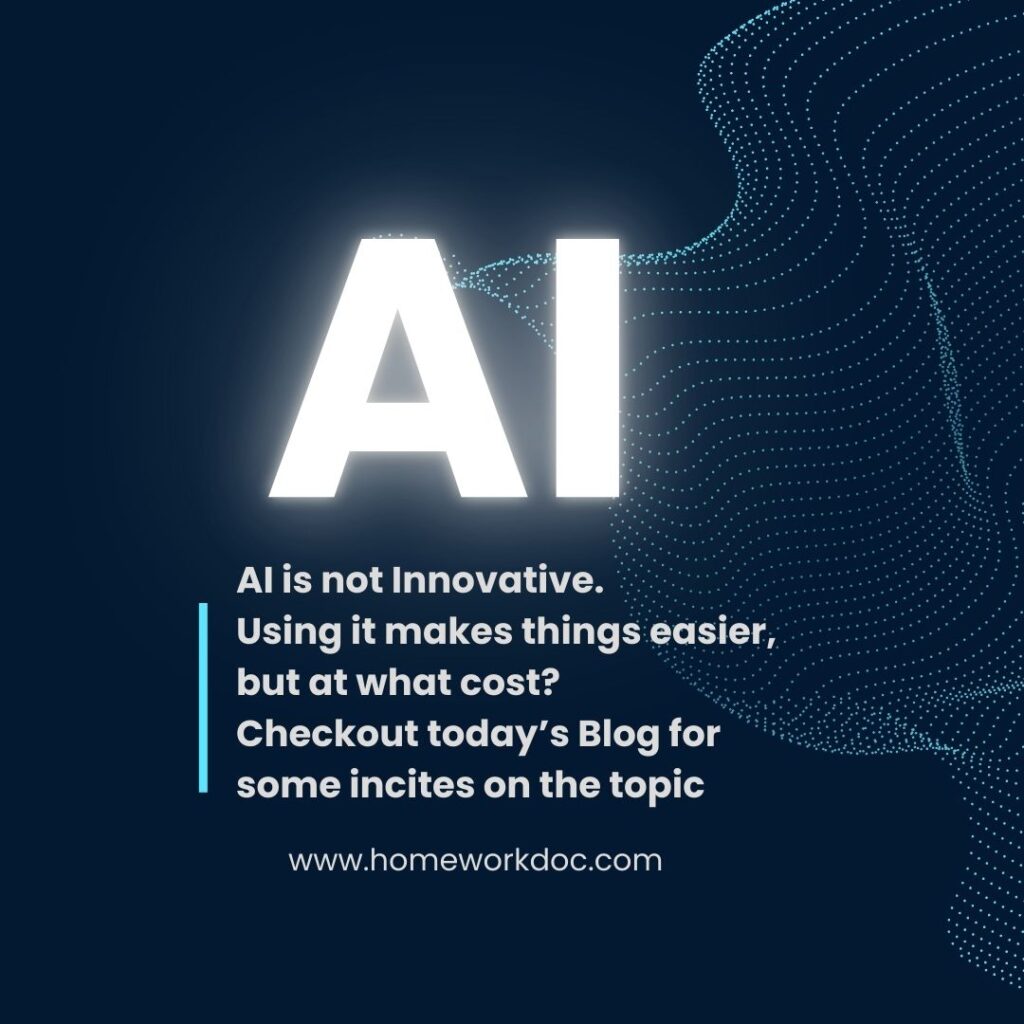“This AI creates a prompt for me, and I don’t have to even do any
thinking,” was used to promote a new AI App. How nice to have someone to
think for users. There are helpful aspects of technology, but at what cost?
Apps can be helpful when examining what other ideas are out there, because the App is good at curating some of the material that already exists on the web. It omits a lot. For this reason, it is important that the user is sure what is written is not the words of an authentic author. That would be considered plagiarism.
Aside from plagiarizing someone else’s work, there is an even greater risk presented by using Apps to create for oneself. When we turn our creativity over to another person or thing, we are not exercising the brain’s creative muscle. Just like the muscles that support our body, when we don’t exercise them, they atrophy. Use the creative muscle or lose it.
When I was young, we had no technology other than telephones, televisions,
and radios. We played music on a record player and later cassette tapes
delivered our music. To remember phone numbers, we manually recorded them is a
telephone book The use of our hand to write the number in the book cemented the
number in our memory and the visual image made the recall of the number
stronger. We had to dial the number and later punched the number to make a
call. This intensified the memory. Ironically, 63 years later, I can still
remember my mother’s work phone number: OR88685.
Fast forward years and technology replaced the telephone book. The smart
phone makes a call by tapping on a person’s name. When my mother passed away, I
was planning on picking my sister up at the airport to go to the funeral. Just
moments before her flight was scheduled to land, my phone died. I had a landline,
but I couldn’t remember my sister’s phone number or the flight information.
Luckily, my computer was working, and I could text her to get the information. Since
I never wrote her number or punched the numbers on the face of the phone, I had
no recall and couldn’t phone her.
I hadn’t written her number down, nor did I have a visual memory because her
name was the only thing that showed up when I used my smart phone to call her.
I phoned her multiple times daily and still couldn’t remember her number. As a
result, I bought a new telephone book and manually filled it with all the numbers
stored in my phone.
When we rely on anyone or anything to do what we need to do for ourselves, we
eventually become so enabled, we shut down the part of the brain that involves recall and
problem solving. To solve the yet to be determined problems we will certainly face in the future, we can rely on the internet. I give us what has been done tried before. We have to exercise our solving problem muscle like Einstein to prepare us for what we might face in the future. Great creators start with questions and continue asking new ones to solve problems independently.
An example is the the Polaroid camera. It is a result of the inventor’s daughter’s curiosity. She was curious about how to see the pictures as soon as they took them. She didn’t like waiting to have them processed. The solution wasn’t invented yet, so no one would have found the answer if one
relied solely on the computer to make it possible.
Turning our creativity over to an App raises an ethical question. If we are trying to develop a positive image on the media, we need to be authentic. Are we misleading the viewers when we represent ourselves by using other people’s created material. AI essentially steals from those who compose on the internet. The prompts AI comes up with are not our thoughts, feelings, or observations. They
are those of unknowns who recorded their original thoughts on the web.
When I research topics I have written books on or done presentations on over
the past 40 years, I have found what appears to be my original work straight
out of one of my online eBooks. How much of what is being generated by AI speaks to the risk of creating plagiarism. AI generated work is not made up of original
ideas, but merely borrowed ones from those who created them. Humans are the
only ones who can create original thought.
Considering one’s use of AI Apps is important. If it is being used to create
a branding, it will be false imaging and unethical. It is not unethical if it
is being used to collect information for personal use.
Ask these questions; Are users turning off their ability to create original work and the ability to solve future challenges by relying on these Apps? Is it ethical to represent AI generated material as one’s own original work? Are viewers going to determine the work is not one’s own? Will credibility be questioned?


